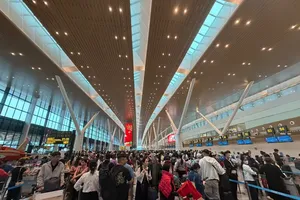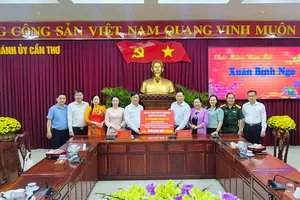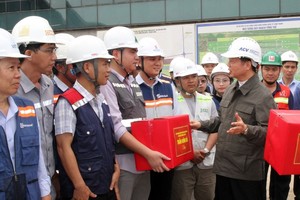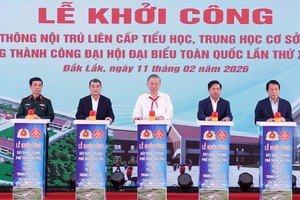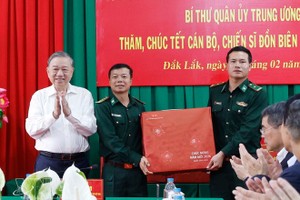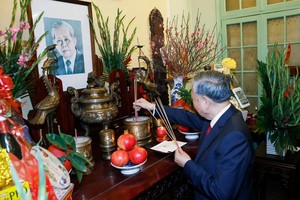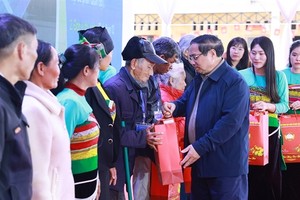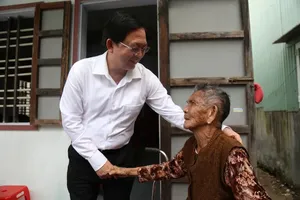It requires unity, strong determination, courage, and the willingness to sacrifice personal interests for the common good of the country. In recent days, many localities across the country have witnessed profound stories of individuals who have prioritized the collective and national interests above all else.
For the country's development
The Standing Committee of the Dong Thap Provincial Party Committee held a meeting to announce the Central Party Secretariat’s decision to approve Mr. Pham Thien Nghia, Deputy Secretary of the Provincial Party Committee and Chairman of the Dong Thap People's Committee, to retire early from February 15, according to his wishes, on February 10. At 59 years old, Mr. Pham Thien Nghia still had about three years before reaching the official retirement age.
According to Mr. Le Quoc Phong, Secretary of the Dong Thap Provincial Party Committee, Mr. Pham Thien Nghia requested early retirement to help facilitate the Provincial Party Committee's efforts in streamlining and reorganizing the administrative apparatus. Alongside Mr. Pham Thien Nghia, two other members of the Provincial Party Standing Committee, two Deputy Heads of Party Committees, and several other leaders also requested early retirement to support the staff reduction and reorganization process.
Following the principle of “moving forward while organizing” and “focusing on action, not retreating,” the nationwide effort to streamline organizational structures and reduce staff is being carried out uniformly, decisively, and urgently at both the central and local levels. The reduction of administrative layers will inevitably result in staff cuts, and the ongoing question of “who stays and who leaves” continues to capture the public’s attention at the grassroots level.
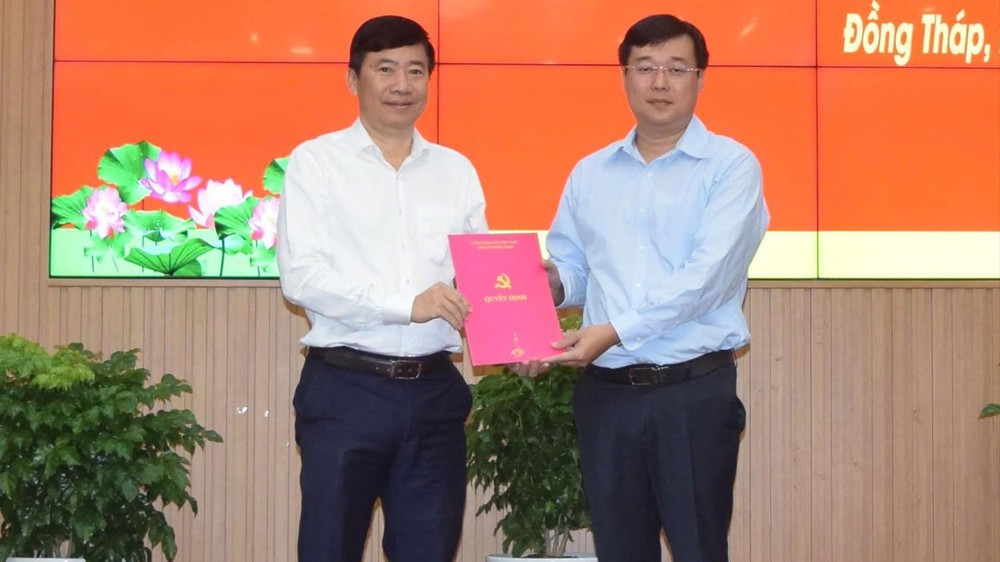
Demonstrating consensus and support for the Party and State’s major policies, many officials, party members, and key leaders in localities have willingly "sacrificed" their personal interests by resigning or retiring early. Effective ideological work and communication about the "revolution" to streamline the apparatus have led civil servants in several areas to step down, thereby facilitating the reorganization process.
Notably, the Department of Agriculture and Rural Development in Ha Tinh Province saw 91 individuals request early retirement, with more than 50 of them having served for 5 to 10 years. In Phu Yen, the Department of Internal Affairs reported that, as of now, 242 civil servants, public employees, and laborers have asked for early retirement or resignation under Decree No.178.
The Department of Agriculture and Rural Development of Phu Yen Province has the highest number of voluntary early retirements and resignations in the province, with 118 individuals.
In Thai Nguyen Province, as the restructuring process continues, many local officials have submitted requests for early retirement. Mr. Pham Thai Hanh, Head of the Provincial Party Committee’s Mass Mobilization Board, shared that, despite having 14 months left until retirement, he decided to step down early to help with the organizational restructuring.
Similarly, in Quang Ngai, early in January 2025, the Chairman of the Provincial People’s Committee signed decisions for 48 officials, civil servants, and public employees to retire early from various departments. In early February, five officials under the management of the Standing Committee of Quang Ngai Provincial Party Committee were granted early retirement, effective from March 1, following the consolidation of several agencies. Among them were two officials from the Provincial Party's Propaganda and Education Board, namely Mr. Dang Ngoc Dung (58 years old, Head) and Mr. Dang Van Nghiep (59 years old, Deputy Head).
In Dak Lak, the Provincial Party Committee’s Organization Board received early retirement requests from Mr. Pham Van Phuoc, Director of the Department of External Affairs, and Mr. Nguyen Van Nghiem, Deputy Director of the Department of Industry and Trade. Mr. Nguyen Van Nghiem stated that after 40 years of service in various roles, he has always fulfilled his duties and is ready to follow the assignments of his superiors. However, to assist in the organizational restructuring, he voluntarily submitted his early retirement request in accordance with regulations and his personal wishes.
Building special and outstanding policies
On February 11, during a meeting of the Standing Committee of the Hai Phong City Party Committee, Party Secretary Le Tien Chau announced that, as of February 10, 34 leaders under the management of the Standing Committee had expressed their desire to retire early from March 1. This decision aims to assist the city in reorganization efforts and provide opportunities for younger officials to contribute and grow.
Among them are two members of the Standing Committee (Ms. Dao Khanh Ha, Head of the Propaganda and Education Board, and Mr. Le Ngoc Tru, Secretary of Hong Bang District), as well as one Vice Chairman of the municipal People’s Committee (Mr. Le Khac Nam). These leaders have taken the lead in implementing the Party’s policy, setting an example by offering to retire early and demonstrating their willingness to make personal sacrifices for the benefit of the organization, facilitating the restructuring of the administrative apparatus and create space for younger officials to step up.
In line with national policy, localities are quickly developing their own policies to support officials affected by the ongoing restructuring. In Ho Chi Minh City, many officials have also voluntarily chosen to retire early to contribute to the city's staff reorganization and downsizing efforts.
Mr. Nguyen Van Nen, Politburo Member and Secretary of the HCMC Party Committee, has called for the development of fair and reasonable policies for officials, civil servants, public employees, and workers during this reorganization process to ensure equity, compassion, and practicality. Currently, the HCMC People’s Committee is formulating appropriate policies for surplus staff after the restructuring and plans to present them for approval at a special session of the HCMC People’s Council in February.
As part of the political system’s reorganization, approximately 100,000 public sector employees are expected to be affected. Those officials and party members in leadership roles who voluntarily retire early are making a significant "sacrifice" for the greater good.
Associate Professor Dr. Nguyen Viet Thong, former Secretary of the Central Theoretical Council, pointed out that a substantial number of officials and civil servants will lose their jobs or be reassigned. This situation requires the "sacrifice" of officials and party members, and such sacrifices should be recognized as a mark of their contributions, as they step aside to facilitate the restructuring process.
According to Minister of Home Affairs Pham Thi Thanh Tra, from the beginning of the restructuring and streamlining process, the Ministry of Home Affairs has placed strong emphasis on proactively managing ideological work to ensure consensus and unity. A revolution in organizational restructuring requires revolutionary mechanisms and policies, which must be quick, efficient, outstanding, humane, fair, and reasonable across all groups.
These special, outstanding policies are designed to encourage individuals to retire immediately within 12 months of the restructuring. Additionally, the policies are tied to the selection and filtering of officials, civil servants, and public employees for retirement, downsizing, restructuring, and improving the quality of the workforce. "We must retain skilled, capable, and qualified officials to prevent a brain drain," Minister Pham Thi Thanh Tra noted.
To protect the rights of officials and civil servants, the Government has passed three important decrees regarding the policies for those who leave their positions and for those affected by the streamlining process. These decrees, effective from January 1, 2025, include Decree No.177/2024/ND-CP, Decree No.178/2024/ND-CP, and Decree No.179/2024/ND-CP focuses on policies for officials, civil servants, public employees, and armed forces during the organizational restructuring of the political system, featuring eight key, outstanding, and humane policies.
The 15th National Assembly opened its 9th extraordinary session on February 12. One of the main focuses of the session is for the NA to review and make decisions on urgent matters related to the ongoing reform of restructuring and streamlining the political system, to meet the high demands of the country in the new era.
NA Chairman Tran Thanh Man emphasized that this effort aims to promptly implement the guidelines and resolutions of the Central Party regarding the restructuring and streamlining of the political system’s apparatus, enhancing efficiency, effectiveness, and performance to ensure that agencies, organizations, and units after restructuring are “upgraded, improved, with better quality and greater effectiveness,” reducing intermediaries, eliminating unnecessary levels, clearly defining the scope, duties, and powers of each agency, and promoting decentralization and hierarchy.
During the session, the NA will consider and approve four draft laws: the revised Law on Government Organization, the revised Law on Local Government Organization, the amended Law on the Organization of the NA, and the revised Law on the Issuance of Legal Documents. In addition, five draft resolutions will be reviewed to guide the restructuring of the NA and the Government during the 15th NA term.




